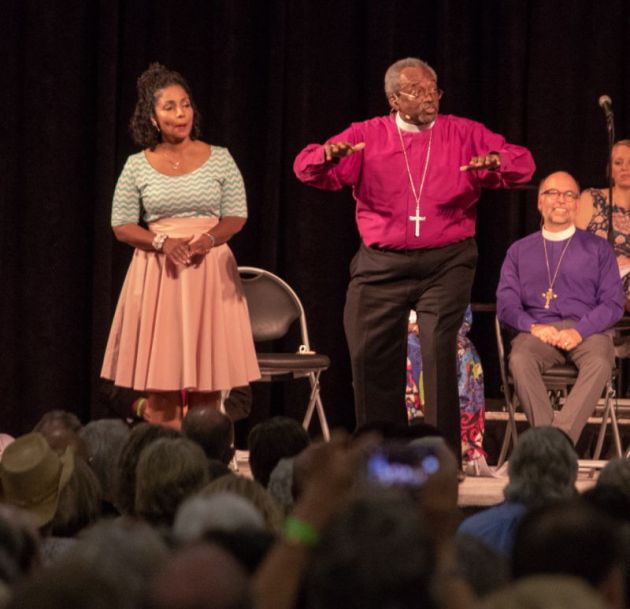US Episcopal Church debates gender in the Book of Common Prayer in Austin Texas

In the Episcopal Church, the language of prayer matters and the Book of Common Prayer, the text used in every Episcopal congregation, is cherished as a core element of Episcopal identity.
And this week, the church, part of the Anglican Communion, is in Austin, Texas debating whether to overhaul that prayer book -- in large part to make clear that God doesn't have a gender.
The history of the Episcopal Church is closely tied to the history of the United States, the church founded after the American Revolution as the successor to the Church of England in the new country.
It has often been seen as the religious institution most closely associated with the American establishment, producing many of the nation's most important leaders in politics and business, Pew Research fact file says.
Even today, the seat of the presiding bishop of the church, the National Cathedral in Washington, D.C., is sometimes called "America's church."
On the eve of the Episcopal Church's 2018 General Convention, Pew that more presidents have been Episcopalian, with a total of 11, than any other Christian denomination.
One of the issues the Episcopal Church is to debate is gender in the Book of Common Prayer.
The terms for God, in the language of the prayers written for centuries, have almost always been male: Father. King. Lord, the Washington Post reports.
"As long as 'men' and 'God' are in the same category, our work toward equity will not just be incomplete. I honestly think it won't matter in some ways," said the Rev. Wil Gafney, a professor of the Hebrew Bible at Brite Divinity School in Texas who is on the committee recommending a change to the gendered language in the prayer book.
Gafney says that when she preaches, she sometimes changes the words of the Book of Common Prayer, even though Episcopal priests aren't formally allowed to do so. Sometime she switches a word like "King" to a gender-neutral term like "Ruler" or "Creator."
Sometimes she uses "She" instead of "He." Sometimes, she sticks with the masculine tradition. "'Our Father,' I won't fiddle with that," she said, invoking the beginning of the Lord's Prayer that Jesus taught his disciples to say in the book of Matthew.
Several of the earliest U.S. presidents, all of whom have been male, including George Washington, James Madison and James Monroe, were Episcopalians.
But since the death of Franklin Delano Roosevelt in 1945, the only two Episcopalian presidents have been Gerald Ford and George H.W. Bush.
Roughly 1 percent of U.S. adults now identify as Episcopalians, according to Pew Research Center's 2014 Religious Landscape Study.
The share of Americans who identify as Episcopalian is relatively unchanged since 2007, even as the share of those in the mainline Protestant tradition (of which the Episcopal Church is a part) and Christians as a whole have declined as a share of the population.
Compared to the general public overall, Episcopalians are older.
For example, 35 percent of Episcopalians are ages 65 or older, compared with 18 percent of U.S. adults.
And just 9 percent of adults who identify as Episcopalian are younger than 30, compared with 22 percent of U.S. adults overall. Nine-in-ten Episcopalians are white.
That's well above the comparable share of U.S. adults overall (66 percent) and just 4 percent of Episcopalians are black, including the presiding Bishop of the Episcopal Church, Rev. Michael Curry.
Most Episcopalians are supportive of gay rights, according to Pew.
Large majorities in 2014 said homosexuality should be accepted by society (83 percent) and that they favor legalizing same-sex marriage (74 percent), which triggered breakaways from the church.
At the Episcopal Church's 2003 General Convention, Gene Robinson became the first priest in an openly gay relationship to be confirmed as a bishop in the worldwide Anglican Communion (of which the Episcopal Church is a member).
And at the 2015 General Convention, the Episcopal Church authorized its clergy to conduct same-sex weddings. Both moves have prompted controversy, including defections from the church and formal discipline from the Anglican Communion.
